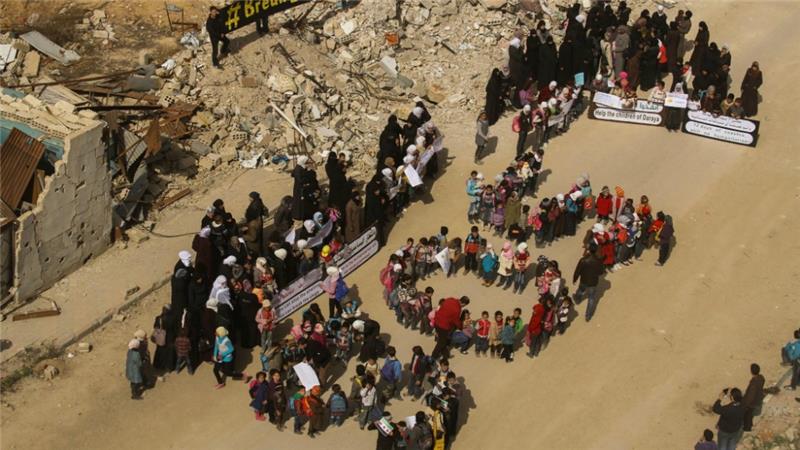LATEST
- OPCW Head: Questions Remain About Assad Regime’s Chemical Weapons and Khan Sheikhoun Attack
- US to Rebels: Fight Only ISIS, Not Assad Regime
A group of 14 countries and the European Union are demanding that the UN Security Council acts to ensure aid convoys reach millions of Syrians.
The letter to the Security Council President, Chinese Ambassador Liu Jieyi, raises serious concerns about the implementation of seven Security Council resolutions on humanitarian access, amid the blockage of aid by the Assad regime.
The UN has been unable to provide any assistance for almost three months — the longest suspension in Syria’s 76-month conflict — largely because of the regime’s refusal to grant permission for convoys.
The letter quoted Security Council resolution 2139, from February 2014, which urged the Syrian authorities in particular to allow “rapid, safe and unhindered humanitarian access” for aid convoys, and which promised the Council would “take further steps in the case of non-compliance”.
The signatories of the letter are the US, European Union, Turkey, Qatar, Saudi Arabia, Japan, Australia, Britain, France, Germany, Spain, the Netherlands, Canada, and Italy.
The regime’s delegation in Geneva did not respond to requests for comment. However, a Russian diplomat said the letter was uncalled for and unexpected, as the issue should have been raised discreetly via the office of the UN’s Syria envoy Staffan de Mistura.
“We consider this as a provocative move that will not help the humanitarian situation in Syria,” the diplomat said. “The situation is not a happy one but it’s not as dire as some countries want to portray it.”
The United Nations says 540,000 people in 11 locations are still besieged, while 4 million Syrians are hard to reach. Only six “hard-to-reach” areas had received aid since April.
Activists says the number of besieged is closer to one million. Most are in opposition areas, although the Islamic State — while retreating elsewhere — is continuing regime-held territory in Deir ez-Zor in eastern Syria.
The Assad regime has forced the capitulation of several important opposition areas over the past year with bombardment, ground offensives, and its “starve or surrender” strategy. These include eastern Aleppo city; the Damascus suburbs of Darayya, Moadamiya, Barzeh, and Qaboun; and the al-Wa’er section of Homs city.
OPCW Head: Questions Remain About Assad Regime’s Chemical Weapons and Khan Sheikhoun Attack
The head of the Organization for Prohibition of Chemical Weapons, Ahmet Uzumcu, say questions remain both about whether the Assad regime has retained chemical weapons.
The regime said, under pressure after its August 2013 sarin attacks near Damascus, that it would give up all chemical stocks. However, Uzumcu told the Australian Broadcasting Corporation that, from early 2014, the questions are arisen over whether some chemicals had been retained: “There are still gaps and inconsistencies that need to be addressed.”
He said the April nerve attack on Khan Sheikhoun, in which at least 92 people were killed and almost 600 wounded, “reinforced suspicions” although the OPCW Fact-Finding Mission does not have the mandate to assign responsibility.
US to Rebels: Fight Only ISIS, Not Assad Regime
The US has reiterated its demand to Syrian rebels to fight only the Islamic State and not the Assad regime, prompting one faction to leave the base near the Iraqi border where the Free Syrian Army is supported by US special forces.
“The coalition supports only those forces committed to fighting ISIS,” its spokesman, US Army Colonel Ryan Dillon, said.
Dillon said the Shohada al-Quartyan “have made it known that they may want to pursue other objectives”, i.e., the confrontation of Assad regime forces in eastern Syria. The spokesman asserted, “The coalition is making it clear to Shohada Al Quartyan leadership that if they choose to pursue other objectives, the coalition will no longer support their operations.”
A US defense official said the commander of Shohada al-Quartyan, Mohammed Qasim, had taken his forces outside the 55-km (34-mil3) “de-confliction” zone surrounding the Tanf base.
The US has established the zone amid an advance by pro-Assad forces. It has carried out airstrikes on three occasions when the forces, including Hezbollah and Iranian-backed foreign militias, moved inside the zone.
The US has restricted its aid to rebels since 2015, shifting its attention to the fight against the Islamic State. Last week Donald Trump confirmed the cut-off of any CIA support for operations against the Assad regime.
Trump’s confirmation came soon after the first US-Russia agreement on a “de-escalation zone” inside Syria.

